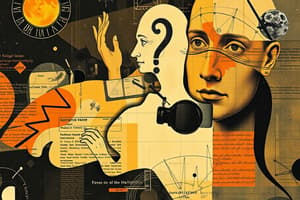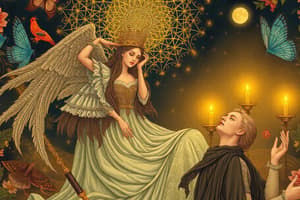Podcast
Questions and Answers
Which component of the mind does the ego represent?
Which component of the mind does the ego represent?
- The personal unconscious
- The unconscious mind
- The conscious mind (correct)
- The collective unconscious
What is a major feature of the personal unconscious?
What is a major feature of the personal unconscious?
- Complexes (correct)
- Biological drives
- Instincts
- Archetypes
Which archetype represents the public persona one displays to others?
Which archetype represents the public persona one displays to others?
- The Persona (correct)
- The Shadow
- The Anima
- The Self
Which function involves making decisions based on personal values and subjective considerations?
Which function involves making decisions based on personal values and subjective considerations?
What do individuals who are categorized as Sensing primarily focus on?
What do individuals who are categorized as Sensing primarily focus on?
What process does Jung describe as the goal of a person's psychological development?
What process does Jung describe as the goal of a person's psychological development?
Which term refers to the dark side or primal urges within the personality?
Which term refers to the dark side or primal urges within the personality?
Extroverts primarily derive energy from which of the following?
Extroverts primarily derive energy from which of the following?
What motivates individuals according to Alfred Adler's Theory of Individual Psychology?
What motivates individuals according to Alfred Adler's Theory of Individual Psychology?
What is the original and normal feeling of inferiority in children called?
What is the original and normal feeling of inferiority in children called?
Secondary inferiority is characterized by feelings of adequacy.
Secondary inferiority is characterized by feelings of adequacy.
The innate drive to overcome inferiority is known as _____ for superiority.
The innate drive to overcome inferiority is known as _____ for superiority.
What does a superiority complex occur when?
What does a superiority complex occur when?
Match the birth order with its typical characteristics:
Match the birth order with its typical characteristics:
What is the role of the creative self according to Adler?
What is the role of the creative self according to Adler?
Goal-directed behavior is primarily based on realistic aspirations.
Goal-directed behavior is primarily based on realistic aspirations.
Flashcards are hidden until you start studying
Study Notes
Layers of the Unconscious Mind
- Ego: Represents the conscious mind, encompassing thoughts, memories, and emotions individuals are aware of.
- Personal Unconscious: Contains forgotten or repressed lifetime experiences that influence behavior and attitudes.
- Complexes: A collection of thoughts, feelings, attitudes, and memories that create a pattern in the unconscious.
- Collective Unconscious: Shared, inherited unconscious knowledge and experiences across generations, expressed through universal symbols and archetypes.
Archetypes
- Persona: The outward face or role a person presents to others, potentially concealing the true self.
- Represents conformity in Jungian theory.
- Anima/Animus: Refers to the inner, unconscious opposite gender archetype.
- Anima: Represents the feminine inner personality for men.
- Animus: Represents the masculine inner personality for women.
- Shadow: The dark, instinctual, and potentially destructive side of personality.
- A source of both creative and destructive energies.
- Self: The archetype integrating all aspects of the personality, striving for unity in experience.
Psychological Types
- Thinking (T) vs. Feeling (F):
- Thinking: Decision-making based on logic and objective considerations.
- Feeling: Decision-making based on subjective values and personal preferences.
- Sensing (S) vs. Intuition (N):
- Sensing: Focus on present reality, tangible facts, and details.
- Intuition: Focus on possibilities, interconnections, and future potential.
- Extroversion (E) vs. Introversion (I):
- Extroversion: Orientation towards the outer world, deriving energy from interaction with others and the environment.
- Introversion: Orientation towards the inner world, deriving energy from reflection, inner feelings, ideas, and experiences.
Individuation
- Individuation is the process of psychological development, becoming aware of oneself, integrating different aspects of personality, and realizing inherent potential.
- Involves integrating the conscious ego with the unconscious.
- Our innate characteristics are "imprinted" on us through evolution.
- These universal predispositions stem from our ancestral past.
- Jung theorized that primitive past experiences influence the human psyche and behavior in the present.
Individual Psychology
- Alfred Adler's theory highlights social interests and the drive for superiority, which motivates individuals to overcome inferiority and strive for growth.
- Inferiority feelings are natural and motivate development.
Primary Inferiority
- A normal feeling of inferiority that leads to productive striving.
- Motivates children to develop, leading to a "courage to be imperfect".
Secondary Inferiority
- An exaggerated feeling of inferiority in adults.
- Can lead to an inferiority complex, characterized by feelings of inadequacy.
Striving for Superiority
- An innate drive to overcome inferiority and strive for growth.
- A motivating force that encourages individuals to "move from below to above."
Superiority Complex
- A complex where the need to prove superiority surpasses actual abilities.
Birth Order
- First-born: Tend towards being "guardians of law and order,” exercise authority, and desire to protect others.
- Second-born: Strive for superiority under pressure, often attempting to surpass older siblings.
- Youngest: More sociable and dependent, commonly seen as the "baby" of the family.
- Only child: Often exhibit dependence, wait for guidance, and seek support.
The Creative Self, Social Interest, and Goal-Directed Behavior
- The creative self: Shapes personality by drawing on hereditary and environmental influences.
- Social interest: An innate human urge to adapt to societal conditions.
- Goal-directed behavior: Driven by personal goals, often based on "fictions" (unrealistic aspirations).
- All behavior is goal-oriented and motivated by striving for superiority, with individuals differing in their goals and methods for achieving them.
Studying That Suits You
Use AI to generate personalized quizzes and flashcards to suit your learning preferences.




